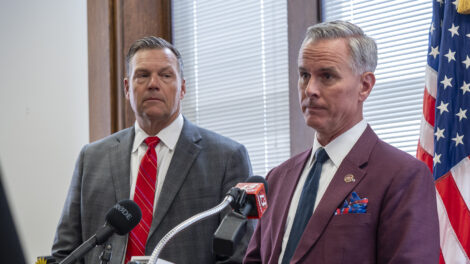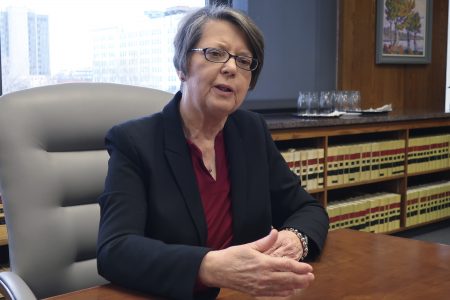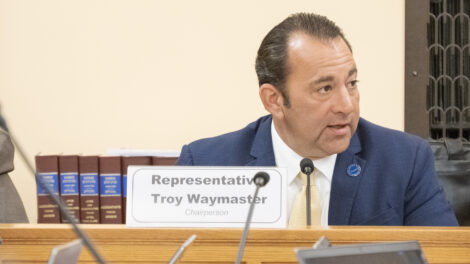Lawrence woman discovers undiagnosed brain injury with help of managed care organization

Teressa Harvey, 64, can sit in her Lawrence mobile home and smile nowadays, ever since a case worker with Amerigroup, which operates the state's Medicaid program, last year discovered she had an undiagnosed traumatic brain injury and began getting her treatment for it. I

Teressa Harvey, 64, makes a dreamcatcher on a recent day at her Lawrence mobile home.
On a recent day, Teressa Harvey welcomed visitors into her Lawrence mobile home.
This might not seem like a remarkable occurrence, but for Harvey it was a huge step in her recovery process.
A year and a half ago, she would hardly leave the house, had her windows blacked out and certainly wouldn’t let anybody inside. She communicated in one of two ways: through crying or explosive anger. She was on a physical-disability waiting list to receive home-based treatment services.
But a case worker with Amerigroup, one of the three managed-care organizations that took over operation of the state’s Medicaid program in 2013 under KanCare, reached out to Harvey and immediately realized her problems weren’t physical in nature: Harvey had an undiagnosed traumatic brain injury. That got her a waiver through the state to start receiving services to learn how to live independently.
So, on the recent day, visitors got to see Harvey smiling and talking about her new business venture: making dreamcatchers that she sells on the Internet.
“It feels like heaven,” the 64-year-old said, threading yarn and cracking jokes she followed with a deep, throaty laugh. “Because I’ve been in a hole and now I’ve been set free. I’ve been given an opportunity to do something with myself and get out of that hole. I got out, and I’m staying out.”
It’s fair to say Harvey has had a tough life. At 14, she was hit and dragged by a car — her first brain injury — which she says made her school years a blur.
“I was always called stupid and dumb and told I would never amount to anything,” she said. “I have no memory of my childhood, so I don’t even know what being a child is.”
Her second brain injury came when a gate fell on her head in 2006. After being discharged from the hospital in a wheelchair, she returned to her mobile home, which didn’t have a ramp. She was forced to stay inside for months, an experience she compares to being imprisoned. Two years later, her son died in a vehicular accident.
Along the way, she was given an incorrect cancer diagnosis and had one of her breasts partially removed. She suffered from blackouts and seizures. She became ever more withdrawn.
When Amerigroup inherited tens of thousands of Medicaid patients last year, the company contacted every person on the waiting list Harvey was on to reassess their needs. That’s when the care coordinator noticed Harvey’s injury was to her brain rather than her body.
“In the past, the state didn’t really have the bandwidth for people to actively work with folks who were on the physical-disability waiting list,” said Amerigroup Kansas president Laura Hopkins. “We were really interested in reaching out and figuring out what we could until there was availability for them to move onto the physical-disability waiver.”‘
Hopkins said Harvey likely got put into the wrong category because a case worker visited her on a day when she was a “poor historian,” made assumptions because Harvey was in a wheelchair, and thought her symptoms presented as a different condition, such as mental illness. “And wrong treatment is worse than no treatment at all,” Hopkins added.
Upon getting the proper diagnosis, Harvey was enrolled into Minds Matter, an Overland Park independent-living service that treats patients in the home. She started receiving physical, speech and cognitive therapy, and began seeing a counselor. She got glasses and dentures. She learned how to read, use a computer and walk without a wheelchair. She organized her home and set up a bank account.
Dr. Janet Williams, the president and founder of Minds Matter, now supports KanCare after initially being skeptical.
“One of my biggest fears with managed care is that they were going to look for a quick fix for everything. That has been tried and clearly hasn’t worked,” she said. “Amerigroup could end services right now with Teressa, but she’d be short of her goals, which means she’d have a much greater likelihood of regressing back and closing the curtains again. The finish line is in sight, but it could take a minute for that to happen.”
On a recent day at her mobile home, Harvey worked on the dreamcatchers she has made for decades but recently decided to start selling on Etsy.
“When I first met you a year ago, you cried from the time you woke up in the morning until you went to sleep at night,” said her cognitive therapist, Natalie Donovan. “Now you spend most of your days smiling and working and busy. It’s a whole different you. The floodgates have opened. You went from being a slow trickle to Niagara Falls.”
Harvey has recently become a motivational speaker in the hopes of reaching others who may currently be lost in the same darkness that she was.
“I don’t want anyone to go through what I went through. Nobody should have to live like that. There are a lot of people institutionalized because they have a brain injury, and if someone just cared they wouldn’t be there,” she said, with the sincerity of someone who truly believes she’s been given a new lease on life.
“If I had not been found, I would still be hiding in a shell. I got a chance to be a new person.”







